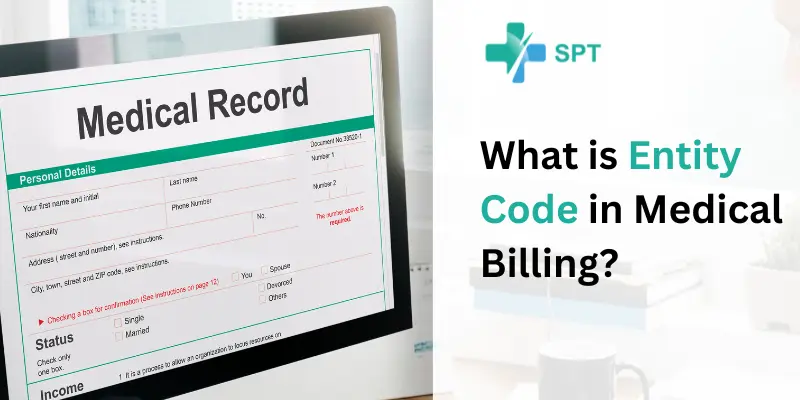In medical billing, an entity code helps know who to bill for services given. It can be set by the doctor, billing office, or payer. Using the right entity code matters. If the wrong code is used, the wrong party may get billed. This can cause problems with programs like Medicare and Medicaid. Each entity has its own code. So using the correct code is key for accurate billing. If unsure about which entity code to use, ask the medical service provider, payment processing office, or payer for help. If you want to know in detail, what is an entity code in medical billing, keep reading.
What is an Entity Code in Medical Billing
Medical billing involves codes that identify different people or groups. These codes are called entity codes. They are used for the parties involved in health care transactions. Such parties or “entities” include:
- Health care providers: For example, doctors, nurses, and therapists. These are professionals who give medical services.
- Patients: The individuals who receive medical care.
- Medical Billing companies: Businesses that specialize in submitting medical bills and claims.
- Insurance firms: Companies that pay health care providers for covered services.
An entity code works like a special code. It tells who gave a service. This code shows which party should get paid for the service. The code acts like a digital sign that points to the right party.
Why Are Entity Codes Important?
Entity codes play a pivotal role in streamlining the medical billing process by:
- Getting Bills Right: Entity codes help healthcare providers bill the right people. This stops mistakes like double billing or missed payments. The right code makes sure the bill goes to the right place.
- Fast Claims Processing: Insurance companies use entity codes to process claims quickly. The right code sends the claim to the right department. This speeds up payment to healthcare providers.
- Avoiding Claim Rejections: Using the wrong entity code can cause claims to be denied. The proper code reduces the risk of rejected claims due to billing errors.
- Clear Responsibility: Entity codes make it clear who is responsible for paying for each medical service. Both providers and patients understand the financial responsibilities.
Entities in Medical Billing
It is important to know the different people involved in medical billing. This helps choose the right codes. Here are the key players:
- Healthcare Providers: Each provider has a special 10-digit code. This code is called the National Provider Identifier (NPI). The Centers for Medicare & Medicaid Services (CMS) gives out these codes.
- Patients: Patients are identified by their insurance company member ID number. Or, they may have another code given by the healthcare provider.
- Third-Party Medical Billing Services: These companies use their own special codes for billing.
- Insurance Companies: Each insurance company has its own way of identifying its members.
Common Entity Codes in Medical Billing:
| Entity Type | Common Entity Code |
|---|---|
| Healthcare Providers | NPI (National Provider Identifier) |
| Patients | Insurance Member ID |
| Billing Companies | Proprietary Billing Code |
| Insurance Companies | Insurance Provider Code |
Entity codes link these entities to the specific services rendered, ensuring proper billing and reimbursement allocation.
How to Get an Entity Code
The process of obtaining an entity code depends on the type of entity:
- Healthcare Providers: Doctors and nurses get a special number called NPI from CMS. They can apply for it online at the NPPES website. This process is not hard.
- Patients: Patients get a unique number from their insurance company. This number is on their insurance card. If not, they can call the insurance company to get it.
- Third-Party Billing Services: These companies have their own way of giving numbers for billing. Their method is different.
- Insurance Companies: Patients do not need a separate number for their insurance company. The insurance company uses its own system to identify patients when doctors send bills.
Entity codes are used in medical billing. But the way codes are written can be different. This depends on the billing system. It also depends on the insurance company. The codes may look different for different providers and insurers.
Also Read: CO-45 Denial Code in Medical Billing.
Entity-related Errors in Coding and Claims
Medical billing can have mistakes even after using entity codes. Here are some common errors with entity codes and how to prevent them:
- Wrong Code Choice: Picking the wrong code can make claims get denied. You might not get paid on time. Check the code matches who gave the service.
- No Code Listed: Leaving out a code can slow down claims processing. Make sure you include all the needed codes on the claim form.
- Old Code Info: Codes like for patient insurance can change over time. Confirm the info on the claim form is up-to-date. That prevents denied claims.
Helpful for you: Top Denials in Medical Billing.
What is the Entity Code Denial?
Sometimes, even after using codes for entities, mistakes can still happen. This could lead to claim denials related to entity information. Here’s what you need to know about these denials:
- Reasons for Denial: Common reasons for entity code denial include:
- Selecting the wrong entity code.
- Missing or incomplete entity code information.
- Using an outdated entity code, particularly for patient insurance information.
- Mismatches between the entity code and the information on file with the insurance company.
- Impact of Denial: If your healthcare provider’s code is denied, it can make getting paid take longer. This delay creates problems with cash flow and adds extra work.
- Resolving a Denial: When you get a claim denied because of a code problem, first look at why the insurance company says it was denied. The reason will be explained there.
Once you understand the reason, you can take corrective action. This might involve:
- Fixing mistakes in the entity code written on the claim form.
- Checking and updating the patient’s insurance details.
- Sending a corrected claim to the insurance company.
Sometimes, you may need to talk to the patient or the insurance firm. This is to get extra details needed to solve the denial.
Expert Tips for Faster Processing and Reduced Errors with Entity Codes
Having worked in the medical billing field for several years, I’ve compiled some valuable tips to ensure faster claim processing and minimize errors related to entity codes:
- Invest in Accurate Data Entry: Double-check all entity code information during data entry to avoid typos or inaccuracies.
- Maintain Updated Patient Information: Regularly verify patient insurance information to ensure the correct entity code is used for billing.
- Utilize Electronic Billing Systems: Electronic billing systems can help streamline the process and minimize manual data entry errors, leading to fewer entity code-related issues.
- Stay Informed of Coding Updates: Stay current with any changes or updates to entity code requirements from insurance companies or regulatory bodies.
- Seek Clarification When Needed: If you’re unsure about the appropriate entity code to use, don’t hesitate to contact the patient’s insurance company for clarification.
You can lower mistakes and delays in medical bill payments. Here’s how to do it. Always double-check the codes you use. Make sure they are correct for the treatments given. Check that the names match the codes exactly. This takes some extra time but saves trouble later. Don’t rush through these important details. Being careful now means quicker payments in the end.
Conclusion
Entity codes are crucial in medical billing. They make sure bills are correct. Claims get processed faster with entity codes. Entity codes also make the billing system clear for everyone. Healthcare providers should follow best practices with entity codes. Having correct data helps doctors use entity codes well. Entity codes let doctors get paid on time for their work.





